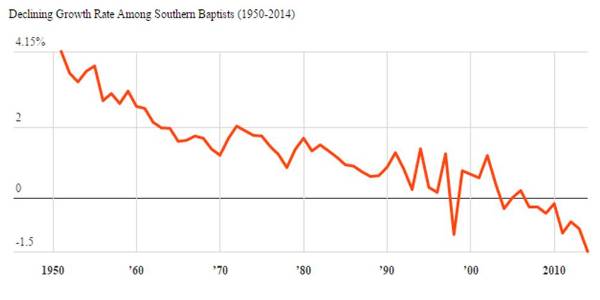A new book is getting buzz all over social media this week: Robert Jones’s The End of White Christian America. It describes the way that white Christians (both Protestants and Catholics) are now in the demographic minority for the first time ever (47%). Data broken down by age shows that white Christians make up 67% of those over 65 and 29% of those 18-29. White Protestantism is where the shift has occurred, both in mainline and evangelical churches. While the mainline churches began their decline earlier, the steepest reversal in growth rate has occurred among Southern Baptists within the past two decades.
There are so many competing narratives for what’s happened. Is it because the white mainline church has sold out the gospel for an inoffensive, uncompelling message that is basically secular liberalism interspersed with some ancient hymns? Is it because the white evangelical church is more galvanized by the talking points of Reaganomics than the Sermon on the Mount? I think both, through their cyclical reaction against each other. I’m not a sociologist, so I don’t have much more than my anecdotal personal story as someone who was raised Southern Baptist and spent my early twenties in dying mainline churches. But I do question whether the mainstream white Christian gospel actually has good news for people living in 21st century America. It’s a question that those of us who care about the church desperately need to ask.
Most Christians who hold onto the conservative evangelical theology I was raised with frame this debate as being between those who want to preserve the gospel that’s always been and those who want to modify it to conform to the sensibilities of every new age. I’m just not sure that’s what’s really going on.
I’m concerned that the modern conservative hyper-emphasis on sexuality (and particularly white female sexuality) is not actually derived in the priorities of Jesus or his apostles, but received its main catalyst in the self-justification of American segregationism (in which white females had to be protected at all costs against horny black men). The regulation of sex has always been a means by which the powerful maintain their control over human societies. Whenever I see sex being discussed in terms of propriety (people filling their proper roles), I see a continuation of the same mindset that justified segregationism. I just don’t think propriety for its own sake has a place in Christian morality, which isn’t to say that I believe in hedonism. Christianity understands holiness in terms of the self-emptying necessary to yield good spiritual fruit. The reason to put limits on my behavior is so that I can be more perfectly available as a vessel of God’s love. The reason gay marriage debates and transgender bathroom panic make no sense to me is because they exude the same concern for propriety that once said black people should live other there and white people should live over here.
Likewise, I’m concerned that an individualistic definition of sin has been shaped by the reactionary need to present a counter-narrative to the collective definition of sin provided by the social gospel in the first half of the 20th century (which is actually closer to the way I see sin being described in the Bible as a massive system of disharmony and injustice). Any contemporary discussion of sin must grapple with the powerful forces unleashed by modern capitalism that turn us into obliviously unjust, mindless consumers unless we actively and intentionally resist them. We have a choice in how we understand the world around us. We can see it as a garden of beautiful sacraments to be enjoyed or a plantation of commodities to be exploited. Sin is to choose the latter. Another word for that is idolatry, which the Bible describes as the root of all injustice.
Finally, I’m concerned that a Christian salvation which obsesses over heaven’s admission requirements is more a reflection of white middle class anxiety than the vision of God’s eradication of injustice and ultimate cosmic reconciliation we find in the Bible. God’s final judgment is actually good news for the oppressed. It’s also good news for those who have divested from their self-justification and surrendered themselves to the mercy of God. Salvation is not getting a hand stamp so that some bureaucratic gatekeeper will let me into heaven. Salvation is becoming part of heaven (Philippians 3:20) by letting God crucify my self-justification and resurrect me into a fully vulnerable, fully present ambassador of his love. If my understanding of Christian salvation allows me to retain my sense that I’m always right and my need to justify myself at all costs, then my damnation has been sealed and I will always live in hell, which will only be more painful the closer I’m sitting to Jesus.
I could say plenty more. The reason I wrote my book How Jesus Saves the World From Us is because too much white Christianity is toxic and utterly antithetical to the gospel of Jesus. There is a Christianity that isn’t toxic. It’s not a new invention; it’s always been there. It’s just the Christianity that never stops being crucified by the Christianity that has been co-opted by the people who would have crucified Jesus in the first century. It really isn’t a tragedy if Christianity shrinks and loses its political clout. That’s actually a wonderful thing. My only hope is that we will stop being toxic, which was actually the whole point from the beginning.

















